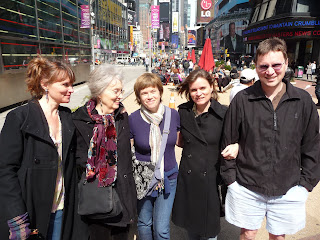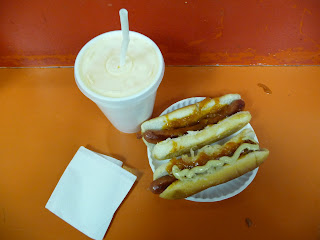
St. Michael's Church, March 26, 2010
Thank you for coming here.
When I think of Dad, I think first of his laugh. Who laughed more loudly? Who loved to laugh more?
Dad liked to make the rest of us laugh, too. As everyone here knows, he was a fount of witty anecdotes.
He coined a lot of funny expressions over the years, many of which became permanent parts of our family lexicon.
If someone interrupted Dad when he was reading, for instance, he would later report that he’d been visited by a member of a dread cohort, “the Anti-Reading Brigade.”
When he was in the midst of a writing project, he would don a special Penn State sweatshirt. But he didn’t call this his writing sweatshirt or his Penn State sweatshirt. It was his Tarnhelm.
Being unfamiliar with Wagnerian opera, the significance of the reference long eluded me. And yet, somehow, I was still amused by it.
Then there was Dad’s memory. In our family, we joked that before Google, there was Dad. He could recite Shakespeare and Keats like the rest us run through the alphabet.
But it wasn’t just high culture that he retained.
After retirement, he’d often wake up and, before crawling from bed, sing to Mom some obscure, cornball ballad he recalled from his childhood. If he forgot a verse, it would usually come back to him before lunch and he would resume the serenade, much to Mom’s amusement.
In recent years, he complained some that his memory wasn’t what it once was. It was still the best in our family.
One night about a month ago, we were on a Bogart kick, watching The Maltese Falcon. Dad had me pause the movie because he wanted to relate some details about the co-star, Mary Astor. He had gleaned this information, too lurid to relate in a church setting, while poring over old newspaper clippings more than a half century ago. The specifics had just stayed in his head all these years, waiting for this moment to pop out.
Then there was Dad’s love of language and story. Who appreciated an artful turn of phrase, or esoteric bit of trivia, more than Dad?
When Dad came across an article he particularly enjoyed, he’d always cut it out. Then he would place it, according to his own Byzantine filing system, in a carefully selected book.
If you poke around in Dad’s library and open a random volume, a newspaper clipping usually flutters out. I imagine that 200 years from now, some bibliophile lucky enough to acquire part of his magnificent collection will puzzle over a faded bit of newsprint with Dad’s scrawl upon it.
On the flip side, Dad was appalled by the misuse of the King’s English. In the last week of his life, as I was trying to make him comfortable, I said, “Dad, would you like to lay down now?” He could barely speak but, from the look that crossed his face, I realized I’d made a cardinal blunder: confusing “lay” with “lie.”
Aside from his uncharitable attitudes about grammatical transgressions, Dad was generous. In the most literal sense, he was generous with the dollar.
Even in our family’s leanest years, I never once heard him complain about a tax bill. Despite having sent four kids to private schools, I never heard him gripe about the cost of tuition, either.
I suspect this places him in one of the smallest demographic slivers of contemporary American manhood.
With me, Dad was big hearted in every way, even when I didn’t deserve it.
As I wobbled into my own adulthood, I wasted more years than I like to admit. Given how hard Dad worked to see I was well educated, it must have bothered him that I was driving a cargo van or delivering pizzas or roofing houses and, at the same time, making a mess of my personal life.
But whatever disappointment he felt, he kept to himself. He just told me, “Follow your heart.”
Then one day, after this had gone on too long and it was clear I didn’t know my own heart, he mailed me $3,000 – an “Oklahoma loan” he called it, meaning that he didn’t expect to be repaid. He instructed me to buy a computer and start writing. So I did, and good things followed.
At Christmas in 1988, Dad gave all his kids a copy of EB White’s essay Here Is New York. I know the date, not because I have Dad’s memory, but because Dad always inscribed books. In my copy, he wrote, “Your birthplace, the way it was. Love, Dad.”
I am embarrassed to admit that years passed before I finally got around to reading the essay, and some more before I understood why Dad always kept a copy by his bedside.
Dad loved New York City– the theater, the newspapers, the opera, the smart and funny people who choose to live here. It made sense that White’s love letter to this city resonated with him.
But there was more to it.
Near the top of the essay, White writes, “New York can destroy an individual or it can fulfill him, depending a good deal on luck. No one should come to New York unless he is willing to be lucky.”
I think that was Dad’s credo. He was willing to be lucky.
In describing his own life, he rarely failed to point out the role of fortune. Though he was raised without a father – in a time when divorce still meant scandal -- he scoffed at the idea that he was from a “broken home.” Instead, he said, it was a good thing that his parents split because it spared him exposure to marital bickering.
“It is not bad to grow up the only male in a house with a mother and two older sisters who adore you,” he wrote.
His childhood spanned the Great Depression and World War Two. Yet even in this, he regarded himself as lucky. It was less cynical time, he would say, and it helped cultivate his romantic sensibility.
When the war came, Dad entered the Navy. He always said he was lucky there, too, because he didn’t get killed and, almost as important, because he was stationed in San Francisco. “I hung around with evil companions,” he would say, recalling his days in the service, “and we had a wonderful time.”
There was more to Dad’s life than good luck. His talents carried him a long way. So did hard work. So did an incredibly cheerful disposition.
Yet there was a paradox to Dad’s optimism.
He was no Pollyanna. If you ever watched the news with him, you learned that he had a pretty dark view of our society. While he rarely used vulgar language – which he saw as a sign of laziness -- he made an exception when certain politicians came on the TV. At such times, his invective could be alarming.
But when it came to his own life, he was always up. To him, every new day was an opportunity to indulge a passion – be it Shakespeare or football or robust conversation. Even if the world was going to hell, he was determined to enjoy himself.
When dad got his diagnosis, he was the only person in the family who wasn’t devastated. I don’t believe this is because he thought he’d beat it. He knew about the long odds of esophageal cancer. Damon Runyon, the subject of one of Dad’s books, died of the disease and he died dreadfully. But if that image lingered in the back of Dad’s mind, he never let on.
After a couple months of chemotherapy, Mom wrote to the oncologist and described the awful toll the treatments were taking. It was decided then to suspend chemo. Dad never complained that it hadn’t worked, or that he’d been made to suffer unnecessarily.
Instead, he celebrated the fact that his treatment was over with, and that Mom had written this wonderful letter and, as he put it, “sprung him.” Ending chemo bought him more time to enjoy Hamlet and the football season and The New York Times and, most important, the company of Mom.
Three days before he died, the hospice nurse visited the apartment. Dad’s voice was a whisper by then and he couldn’t eat or drink. By any objective standard, he was in awful shape. But when the nurse asked him how he was doing, he rasped, “No pain.” Then he said, “This is not such a bad way to check out.”
He considered himself lucky, right to the end. -30-
















































